A look back at legendary pharmacist, civic and women’s advocate, Shirley G. Bridge
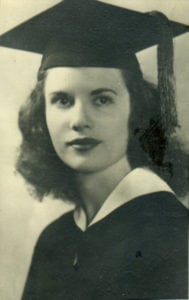
As we near our 125th Anniversary in 2019, we continue to remember our history and the alumni legends in science and pharmacy practice who laid the groundwork for our collective success.
BORN IN 1922 at Swedish Hospital in downtown Seattle, Shirley (Selesnick) Bridge’s life began at the center of the city she loved. Shirley’s early family life was modest. Her father was a tailor and her mother ran the elevator in a department store downtown. They lived in a 4th floor apartment on Capitol Hill, in a building that had no elevator. The trolley down Denny Hill to the grocery store cost five cents each way, so she saved her money and walked up and down the hill instead.
Working for the public good was central to Shirley’s identity as an advocate for women, children, health care, human rights, and projects in the Jewish community. Over the course of her life, she helped develop housing for people living with AIDS, brought improvements to Harborview Medical Center, supported the Northwest School for Hearing-Impaired Children, served as president of the Seattle Women’s Commission, and was a founding member of the Women’s Endowment Foundation of the Jewish Federation of Greater Seattle.
After graduating from high school, she borrowed $200 from an aunt to enroll at the UW to study pharmacy in 1940. “Our mother was the one who pushed us into pharmacy,” she said in the Oral History interview. “She always said to me that you should be able to support yourself and your kids.” Shirley loved chemistry and had a knack for it, studying with a teacher in high school whose class was so rigorous, that, in her first year at the UW, she didn’t have to study at all.
“We used slide rules and we did practical pharmacy,” she recalled. “We did something called ‘pharmacognosy’ which is just like botany.” She worked two jobs and even took a year off to support her studies and those of her sister, Beverly, who was also studying pharmacy. Despite those challenges, Shirley graduated magna cum laude in 1945, and went on to be one of the state’s first female pharmacists, spending her entire career in community pharmacy.
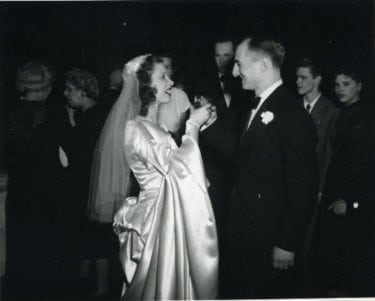 She met her husband, Herb Bridge, at a picnic in 1947 while on a double date. Only Shirley wasn’t on a date with Herb; she was with his friend. Undaunted, Herb pursued Shirley and proposed on their second date. A few weeks later, he presented her with an engagement ring. In his autobiography, he describes their conversation. “Do you like it?” he asked. “Well, yes,” she said. “Fine. We’re engaged.” With that and a promise to support her career as a pharmacist, Herb’s search for a smart, career-oriented woman with a mind of her own was successful. They wed on January 25, 1948.
She met her husband, Herb Bridge, at a picnic in 1947 while on a double date. Only Shirley wasn’t on a date with Herb; she was with his friend. Undaunted, Herb pursued Shirley and proposed on their second date. A few weeks later, he presented her with an engagement ring. In his autobiography, he describes their conversation. “Do you like it?” he asked. “Well, yes,” she said. “Fine. We’re engaged.” With that and a promise to support her career as a pharmacist, Herb’s search for a smart, career-oriented woman with a mind of her own was successful. They wed on January 25, 1948.
Herb and Shirley Bridge made their first home at 604 East Union, where the rent was $52.50 a month (Ed. note: that’s not a typo). Shirley worked at Colden Pharmacy downtown and Herb was a reservist in the Navy and worked in his father’s store, Ben Bridge Jewelry. In 1950, Shirley gave birth to their first son, Jon, and months later Herb was sent to the Korean War. A few years later, their second son Daniel was born. Shirley returned to work soon after each birth and her Aunt Gert took care of the children.
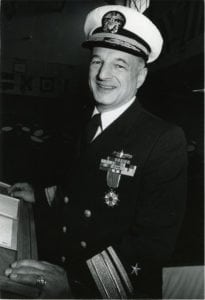 The couple continued to grow professionally and became more civically active as their family grew. Herb was nicknamed “Mr. Downtown” for his advocacy in creating a vital city center while Shirley advocated for legislative changes. In 1973, Shirley had gone to her local bank to co-sign a loan for a friend. The bank manager said, “I’m sure Herb won’t mind [if I give you a loan], I’ll give him a call.” Shirley informed the bank manager that she minded a great deal. She advocated for a new law and within a year, Washington state became the first to ban discrimination in credit and insurance based on sex or marital status.
The couple continued to grow professionally and became more civically active as their family grew. Herb was nicknamed “Mr. Downtown” for his advocacy in creating a vital city center while Shirley advocated for legislative changes. In 1973, Shirley had gone to her local bank to co-sign a loan for a friend. The bank manager said, “I’m sure Herb won’t mind [if I give you a loan], I’ll give him a call.” Shirley informed the bank manager that she minded a great deal. She advocated for a new law and within a year, Washington state became the first to ban discrimination in credit and insurance based on sex or marital status.
She was a tremendous patient advocate; on the Board at Harborview she saw the devastating impact AIDS had on patients and their families. As the HIV/AIDS epidemic spread, filling many with fear, “Shirley went around to neighborhoods knocking on doors to explain about AIDS and to reassure people,” wrote Herb. In 1992, thanks in part to her advocacy, the Bailey Boushay House opened, to be followed by the Shirley Bridge Bungalows, located in West Seattle, which offered affordable housing to families affected by HIV/AIDS. She had a passion for supporting women—young, female pharmacists in particular—and was a long time supporter of UWSOP. In the Oral History, Shirley said her mentors were junior faculty members, Joy Plein and Karan Dawson. Shirley “was a mentor to me and to all the women faculty of our School at a time when schools of pharmacy had few women faculty,” said Joy. “She earned her successes, which were many, and she was a role model for the rest of us—very competent, confident, compassionate and engaging. She
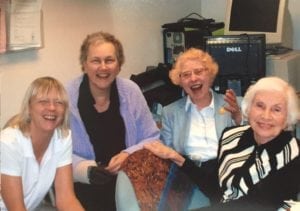
would invite the women faculty to breakfast and we knew that along with the laughter and friendship she would go around the table and ask each of us what we were working on. We all wanted to have something to report and she frequently asked how she could help. We loved and admired her and she loved us and her alma mater.”
“I was very honored to learn that Shirley considered me one of her mentors. I have always known that it was the other way around.”
—Joy Plein, Professor Emeritus, UW School of Pharmacy
In the practical way of a survivor of the Great Depression, Shirley maintained her pharmacist license until the day she passed. In his autobiography, Herb joked, “She wanted something to fall back on in case my [Ben Bridge] jewelry business didn’t work out.”
Shirley was also a cancer survivor, having fought five different primary cancers: colon cancer in 1955, then uterine, bladder, breast, and cecum cancer over her lifetime. “No sooner would she get out of the hospital than she would go on with her fundraising or working as a pharmacist,” said Herb. After a 53-year battle with cancer, Shirley passed away in 2008 with her family at her side. Her legacy in pharmacy and advocacy live on here at the UW and in her family, who have continued to serve the public good.
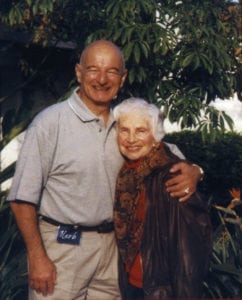 The family endowed a professorship in Shirley and Herb’s name to fund female faculty and research in geriatric pharmacy. Shirley and Herb Bridge Endowed Professor Peggy Odegard established UW Pharmacy Cares with other UWSOP faculty, creating a faculty practice that provides a new approach to training our PharmD students, along with medication-related consultation and education to community-based partners. “The Bridge Endowment means a lot to this school,” said Peggy. “Without an endowment, innovative advances to pharmacy education and research are difficult to establish.” Shirley’s son, Jon, graduated magna cum laude with honors in economics at UW, followed by UW Law School, nine years active duty in the Navy and 22 in the reserve. Today, Jon shares leadership of Ben Bridge Jewelry as general counsel and co-CEO and with his cousin Ed Bridge, and serves on the Board for the Alliance for Education. With his wife, retired state Supreme Court Justice, Bobbe, herself an alumna and affiliate professor of law at UW, they founded the Center for Children and Youth Justice, a nonprofit for the reform of the juvenile justice and child welfare systems. Shirley’s son Dan became a Rabbi and served as Executive Director of Hillel UW from 1988-2007. After retiring from Hillel, he has consulted to many non-profits across Seattle. He currently serves as the Interim Executive Director of the Seattle Audubon Society and is the Emeritus Executive Director of Hillel UW. His wife Simcha Shtull has a private practice as a psychotherapist.
The family endowed a professorship in Shirley and Herb’s name to fund female faculty and research in geriatric pharmacy. Shirley and Herb Bridge Endowed Professor Peggy Odegard established UW Pharmacy Cares with other UWSOP faculty, creating a faculty practice that provides a new approach to training our PharmD students, along with medication-related consultation and education to community-based partners. “The Bridge Endowment means a lot to this school,” said Peggy. “Without an endowment, innovative advances to pharmacy education and research are difficult to establish.” Shirley’s son, Jon, graduated magna cum laude with honors in economics at UW, followed by UW Law School, nine years active duty in the Navy and 22 in the reserve. Today, Jon shares leadership of Ben Bridge Jewelry as general counsel and co-CEO and with his cousin Ed Bridge, and serves on the Board for the Alliance for Education. With his wife, retired state Supreme Court Justice, Bobbe, herself an alumna and affiliate professor of law at UW, they founded the Center for Children and Youth Justice, a nonprofit for the reform of the juvenile justice and child welfare systems. Shirley’s son Dan became a Rabbi and served as Executive Director of Hillel UW from 1988-2007. After retiring from Hillel, he has consulted to many non-profits across Seattle. He currently serves as the Interim Executive Director of the Seattle Audubon Society and is the Emeritus Executive Director of Hillel UW. His wife Simcha Shtull has a private practice as a psychotherapist.
In Shirley’s obituary, Herb remembered her as being “so instrumental in encouraging me in the right way and letting me know I could do things, whether it was the Navy or business or in the community. She was the material reason for any success I’ve enjoyed.”
We were saddened to learn of the passing of Shirley’s husband and Seattle legend, Herb Bridge, on April 2, 2018. He will be greatly missed.
This story owes a debt of gratitude to Herb Bridge’s autobiography, Building Bridges, and the Oral History of Shirley G. Bridge by the Jewish Women’s Archive.